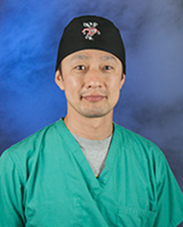Instructor

Dr. Kei Hayashi, DVM, PhD, DACVS
Associate Professor of Surgery, College of Veterinary Medicine, Cornell University
Dr. Kei Hayashi graduated from the University of Tokyo with BVMS/DVM/PhD degrees (1993-1997), and then obtained MS and PhD degrees at the University of Wisconsin (1997). He completed a small animal surgery residency at the University of Wisconsin (2003) and became a Diplomate of the American College of Veterinary Surgeons, ACVS(2004). He served as an assistant professor of small animal Orthopaedic surgery at the Michigan State University (2003-2005) then moved to UC Davis and was tenured in 2012. He began his appointment at Cornell in February 2013. Dr. Hayashi serves as a member of advisory board of the Asian Society of Veterinary Surgery (AiSVS), the Japanese College of Veterinary Surgeons (JCVS), and the Asian Board of Veterinary Specialties (AiBVS).
Dr. Hayashi has published more than 100 articles in the area of Orthopaedic research. His research focus is in pathology of ligament/tendon injury and wound healing, evaluation of total joint replacement systems, molecular profiling of osteoarthritis, and comparative Orthopaedics and sports medicine. His clinical interests are in arthroscopy, total joint arthroplasty, biological approach to joint surgery, minimally invasive fracture treatment, and application of novel research discoveries (such as stem cell and regenerative medicine technologies) to clinical patients.
Information
| Date: | 6 & 7 October 2014 (Monday & Tuesday) | ||||||||||
| Time: | 9:00 am to 9:00 pm | ||||||||||
| Venue: | Multi-function Room, 8/F, Academic Building 3, City University of Hong Kong, Kowloon Tong | ||||||||||
| Fee: | One day workshop and 2 evening lectures: HKD 3500 One evening lecture: HKD 380 Two evening lectures: HKD 680 |
||||||||||
| CPD: | CPD credit will be awarded to veterinarians attending the workshop and evening lectures. For details, please refer to HERE
|
Day 1, 6 October, 2014
| Workshop/Lecture | Time | Topic |
| Orthopaedic Workshop WORKSHOP FULL |
9am - 10am | Lecture on Stifle surgery |
| 10am - 12pm | Stifle Lab 1. Surgery for medial patella luxation – Tibial tuberosity transposition and patella groove deepening 2. Surgery for cruciate ligament rupture – extra-capsular suture technique with inspection/removal of medial meniscus |
|
| 2pm - 3pm | Lecture on fracture labs | |
| 3pm - 5pm | Fracture Lab 1. Plating techniques. These are commonly used in HK in radius fractures in toy dogs 2. IM pin with Cerclage wires. Commonly used technique due to their cost |
|
| Evening Lectures AVAILABLE |
7pm - 9pm | Medial patella luxation and cranial cruciate ligament rupture 1. Approach to a dog with medial patella luxation – Grading, radiological assessment, indication for surgery versus medical management, choice of technique 2. Approach to a dog with cranial cruciate ligament rupture – Radiological assessment, indication for surgery vs medical management, prognosis for arthritis, choice of technique |
Day 2, 7 October, 2014
| Workshop/Lecture | Time | Topic |
| Orthopaedic Workshop (Repeat of Workshop on 6 October) WORKSHOP FULL |
9am - 10am | Lecture on Stifle surgery |
| 10am - 12pm | Stifle Lab 1. Surgery for medial patella luxation – Tibial tuberosity transposition and patella groove deepening 2. Surgery for cruciate ligament rupture – extra-capsular suture technique with inspection/removal of medial meniscus |
|
| 2pm - 3pm | Lecture on fracture labs | |
| 3pm - 5pm | Fracture Lab 1. Plating techniques. These are commonly used in HK in radius fractures in toy dogs 2. IM pin with Cerclage wires. Commonly used technique due to their cost |
|
| Evening Lectures AVAILABLE |
7pm - 9pm | Overview of fracture fixation 1. How to choose the appropriate fixation technique for different fractures, some basic rules for each technique including common Dos and Don’ts, 2. Assessment of fracture healing including non-union and malunion. |
For enquiry, please call (852)3442-6138 or email to cvmls.cpe@cityu.edu.hk
